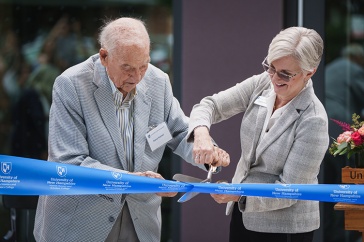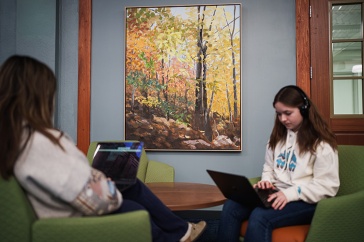
Participants in this year's HOOT experience climbing at the Browne Center.
For a group of incoming UNH honors students, their first days of college won’t be remembered for a feeling of homesickness or anxiety around fitting in but rather for dodging poison ivy while playing capture the flag, attempting to decode unknown animal noises in the middle of the night and spontaneously square dancing in near-total darkness.
About 30 honors students participated in this year’s Honors Outdoor Orientation Trip (HOOT) in August, a three-day, two-night experience in which first-year students are driven almost immediately after arriving on campus to the Browne Center in Durham, where they camp for two nights before hiking back to UNH – a journey of about seven miles – as a group on the third day.
It was the second year of the program, which is led by Brent Bell – an expert in outdoor experiential education and associate professor of recreation management and policy at UNH – and designed with graduate student Trevor Guilmette to foster a sense of camaraderie and community and to ease the transition to college.
Based on the response from participants – who this year wrapped up the final night at the Browne Center with an unplanned talent show that led to square dancing by flashlight – it’s mission fully accomplished.
“I went into HOOT feeling anxious about the transition to college, not knowing the ins and outs of how it all worked, uneasy about making friends, and finding a place where I fit in. HOOT cured all of those anxieties in the first few hours of being there,” says Raegan French, who participated as a first-year student last year and returned as a student leader this year. “I felt like I was a part of something bigger than myself. I found a community there in the woods that allowed me to be myself and feel confident and enthusiastic about starting the next chapter of my life here at UNH.”
Much of Bell’s professional work focuses on outdoor orientation programs, and HOOT is the latest in a line of several that have been held over the years at UNH. For HOOT, students start at the UNH Browne Center, where they set up campsites in four different areas. The second day features a high ropes course activity for all of the students, and the third day is what Bell calls the “marathon,” a roughly seven-mile run/hike back to campus that ends with the students running under the arch at Thompson Hall and gathering on the T-Hall lawn for a program debrief.
"I went into HOOT feeling anxious about the transition to college, not knowing the ins and outs of how it all worked, uneasy about making friends, and finding a place where I fit in. HOOT cured all of those anxieties in the first few hours of being there."
The time between those activities belongs to the students, and that’s where some of the true magic happens, Bell says. This year’s cohort played a memorable game of capture the flag during their first day on-site and instigated the talent show during the final night at the Browne Center, an evening that featured impromptu musical performances by several students before Browne Center staff taught the group to square dance by “lantern light” – which was just an “incredibly bright flashlight,” French mused.
The structure of the program is designed to prompt students to interact with fellow classmates in a variety of situations, quickly breaking down social barriers and creating an atmosphere of acceptance that can take much more time during a traditional orientation program.
“That’s always the great hope, that it’s a celebratory time of getting to know each other,” Bell says. “New students are often afraid of connecting due to worries about things like their new status, who they will be, how they will fit in. What I love about outdoor orientation programs is camping is an effective way for all the new students to feel equal to each other, while it also exposes them a little bit, like “this is just who we are.” And along with that comes a lot of acceptance, and I think that’s really powerful for the students.”
A big part of that acceptance is acceptance of self. Bell notes that the HOOT group employs something of a mantra – “no discount.” The idea is not to discount yourself or put yourself down in any situation, and the group will often politely remind any participants who do so by using the phrase.
One student this year was struggling to muster the courage to try the ropes course, and he began to insult himself as a result. He managed to give the course a try but loudly admonished himself again after falling before completing the full circuit.
“Almost 40 people yelled in unison, ‘No discount!’” Bell says. “Everyone started laughing, and it took this emotional moment and changed it. Everyone was just being really encouraging, and there’s a lot of setups for moments like that during the trip.”
“My favorite moment from this year's trip was the high ropes course. I could tell that each of the members of my group were trying to challenge themselves, and I saw them all encouraging each other and cheering everyone on as they went,” adds Cassidy O’Brien, a student leader this year taking part in the program for the first time. “I really felt like we built trust in one another and always had someone in our corner rooting for us, which is so important when you're starting school.”
The students are forced to work together to solve problems, as well, which this year included troubleshooting faulty camping stoves and finding their way back on track after getting briefly lost during the hike back to campus. Working through challenges as a group further galvanized the participants, several of the leaders said.
The experience is only three days long, but evidence illustrates that programs of this nature have impressive staying power, Bell says. Research has shown that participants in outdoor educational programs rate their experiences as more important over time, even up to 25 years later, and numerous studies show that outdoor orientation programs increase student retention to college.
Bell notes a research study on a previous trip at UNH in which all of the participants were given a bandana at the end that was tied to personal meaning from the experience. At a 17-year follow-up, every single person who responded still had their bandana, including one participant who said they had lost it and hunted down an identical replacement.
Bell says the idea of some of the activities is for the students to challenge themselves or step outside of their comfort zones, a choice that often leads to solidifying that lifetime memory. Because the students are all in the same boat, they can draw inspiration from classmates and share in their successes and achievements.
“In a general sense what I love is to see people taking risks. And that doesn’t neccessarliy mean physical risks, but rather creating a space where you can see and observe all types of courage. There’s nothing more heartening than seeing someone take the risk to be themselves and then seeing it pay off with acceptance,” Bell says. “Those kinds of things thrill me, because those small things make a big difference to students in transition.”
The program has certainly left an impact on its participants during the first two years, as Bell noted that several student leaders this year returned after taking part as first-year students last year. Such was the case for Daniel Sixon.
“It’s packed with engaging activities and games that help students to step out of their comfort zones and get to know each other. Being such a unique experience, there is an incredibly strong sense of community among HOOT members, and it genuinely feels like a family,” Sixon says.
Others who have taken part walk away with a similar feeling, and most who complete the experience find it fully accomplishes the goal of smoothing the transition to college.
“HOOT creates such an incredible sense of community and belonging for students almost immediately,” says O’Brien. “As a leader, I learned a lot about what it can mean to connect with new people. Watching incoming students come out of their shell and seeing the first-year nervousness melt away was really inspiring.”
-
Written By:
Keith Testa | UNH Marketing | keith.testa@unh.edu
















































